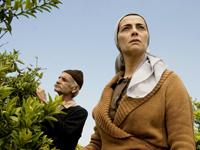Lemon Tree Reviewers Can’t See the Forest For the Trees

Imagine a film about the hardships endured by ordinary Germans subjected to heavy bombardment during World War II – and, for example, the heroism of those coming to the rescue of injured victims buried in the ruins of collapsed buildings. But imagine, as well, that this film provides no context dealing with the problem that led to the bombardment – which was the leadership that the German people followed, one whose brutal aggression caused enormous and widespread suffering and led to World War II. Lacking this context, an uninformed audience might not realize that the German people largely brought on their own suffering. Such a film would almost certainly be dismissed as propaganda.
Yet what wouldn’t be acceptable in a film about the suffering of ordinary Germans is indeed acceptable to the mainstream media when the film deals with the suffering of ordinary Palestinians (this is not to say that Nazi Germany is equivalent to the Palestinian Authority). Generally praised by reviewers, the film at issue is Lemon Tree, by the Israeli writer/director Eran Riklis, which premiered in New York in April followed by showings in other venues across America. European audiences (the film was the “Audience Award Winner” at the Berlin Film Festival) and American audiences (the May 24 Boston Globe rated the film at three stars as compared to Hannah Montana with two stars) have been subjected to a skillfully made propaganda film containing nothing about the fact that current Palestinian suffering has been largely brought on by the Palestinians themselves in generating and supporting horrific terrorism against Israelis.
The Lemon Tree, released by IFC Films, portrays a fictional Palestinian heroine protecting her lemon trees from Israeli soldiers who are ordered to severely prune the trees because it is feared that they are likely to be used as cover by Palestinian terrorists. The 106-minute film is in Arabic and Hebrew, with English subtitles (with only a few scenes spoken in English).
One message the film sends is that the Palestinians are likable, noble, straight-forward and peaceful, while Israelis are generally abusive, arrogant, ruthless and sometimes physically brutal. The only sympathetic Israelis seem to be those who support the Palestinian heroine.
Another message of this film is that the Palestinians, unlike the Israelis, lovingly nurture the land, a one-sided portrayal at odds with reality. Jewish pioneers returned – in increasing numbers to their ancestral land in the 19th and 20th centuries – to nurture and bring back to life, land left largely barren by Arab nomads and others. Accordingly, today’s Israel prospers from the agricultural yield provided by descendants of those pioneers who, together with other Israelis, are prolific growers of citrus fruits and other crops. Furthermore, Israel is the only country in the world that entered the 21st century with more trees than it had at the beginning of the 20th century! One would never know from this Riklis film (or its reviewers) that love of fruit trees in ingrained in Jewish culture: Once a year, Jews, especially Israelis, celebrate Tu b’Shevat (New Year of the Trees). Not surprisingly, the political agenda of such films makes it unlikely that they would ever deal with actual events like that of the valuable Israeli Gaza green-houses left to Palestinians who promptly destroyed the structures out of pure hatred for Jews (nor would reviewers bring out this point).
However, an important point missed by other reviewers of the film did not elude Daniel M. Kimmel writing in Boston’s Jewish Advocate (May 1, 2009):
Israeli filmmakers can see the humanity of the average Palestinians. This may upset the hardliners on both sides, but it begs the real question: Where are the Arab films in which decent Israelis are shown to struggle under the present circumstances? Where is the reciprocity? Wafa Younis may know something about that. She’s the former conductor of a Palestinian youth orchestra that was disbanded by Palestinian authorities after it played a concert for Holocaust survivors. When a Palestinian can make a movie like Lemon Tree and even be celebrated for it, then perhaps we will be ready for peace.
More from SNAPSHOTS
CNN’s Amanpour Condemns “power grab” By Israel’s Prime Minister and Others
April 1, 2020
We’ve said it often, but it’s worth repeating: Anyone interested in reasonably unbiased information about Israel (at least) should avoid the broadcasts of CNN’s Chief International Correspondent and Anchor, Christiane Amanpour. In characterizing responses to [...]
Seattle Media Oblivious To Imam’s Hateful Indoctrination Condemning Jews
January 7, 2020
The Masjid Ar-Rahmah mosque teaching – that Allah transformed Jews into apes and pigs for disobeying him – delivered by Imam (prayer leader) Mohamad Joban – was posted online by mosque personnel. This December 2019 [...]
AP Distorts: Bethlehem ‘Almost Completely Surrounded’
December 10, 2019
Over two years after improving inaccurate language falsely citing Israel's security "barrier surrounding the biblical city" of Bethlehem, the Associated Press once again misrepresents. AP's Joseph Krauss and Mohammad Daraghmeh wrote yesterday ("Palestinians in Bethlehem [...]
Reuters Errs on Administrative Detention For ‘Anti-Israel Activity’
November 5, 2019
The Ofer Prison, near Ramallah (Photo by Tamar Sternthal) A Reuters article today egregiously misrepresents administrative detention, erroneously asserting that it is mainly applied to "Palestinians suspected of anti-Israeli activities," when in fact the Israeli [...]


